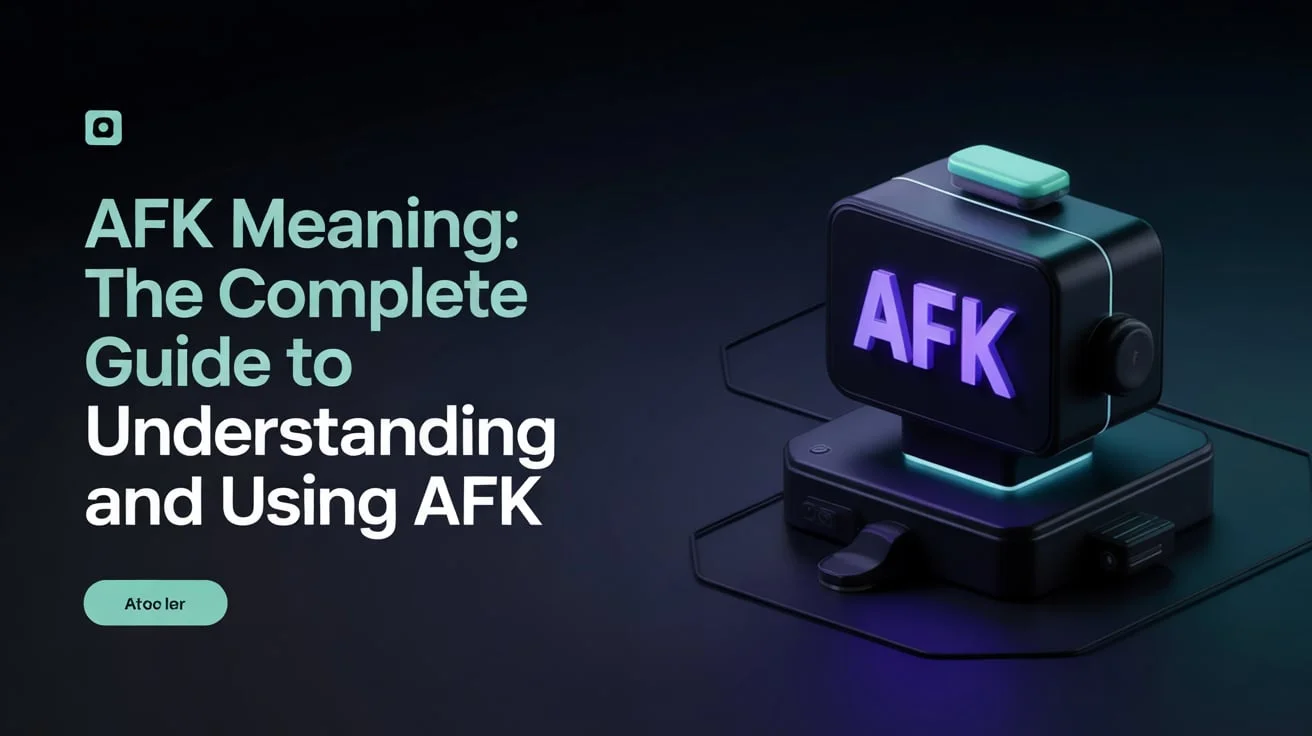Whether you’ve spotted “AFK” in a gaming chat, team chat, or social post, this acronym may have left you curious. In this guide you’ll learn what AFK means, how it’s used, and why it matters in digital communication.
What Does AFK Mean?
Literal Breakdown
“AFK” stands for Away From Keyboard. (Dictionary.com)
It originated when people needed a quick way to say “I’m stepping away from my computer or device.” (Grammarly)
Evolution of Meaning
While it began in early chat rooms and online games of the 1990s, AFK has grown into broader use. (Business Insider)
Now you’ll see it even when someone steps away from their phone, tablet, or even social media—so long as they’re essentially “not present” for a moment.
Why It Persists
There are a few reasons:
- It’s short and efficient: three letters, instant meaning.
- It signals presence (or rather, temporary absence) clearly.
- It resonates with digital culture: fast chat, multitasking, online lives.
Because of that, it sticks around even as devices and platforms change.
Common Situations & Contexts: Where You’ll See AFK
Gaming and Streamer Culture
In online multiplayer games and streaming chats, AFK often means you’re still logged in, but not actively participating. For example:
“Sorry team, I’m AFK for 5 minutes — bathroom break.”
It signals to teammates: don’t expect a response or action for a moment.
Workplace and Remote Communication
In casual work-chats (Slack, Teams, Discord), a user might write:
“Going AFK until 3 pm for appointment.”
Here, they’re saying: “I’ll be unavailable for a little while.” The tone is informal, but the purpose is clear.
Social Media, Texting & Forums
You might see posts like:
“AFK this weekend to recharge!”
Or a quick chat reply:
“afk for a sec, phone rang.”
In these cases the user is notifying friends/followers of their short‐term departure. (Trinka)
Real-Life and Hybrid Use
Increasingly, people use “AFK” offline too:
- At lunch: “Going AFK for an hour.”
- At meetings: “AFK for the next session.”
Even though the term mentions a keyboard, the meaning extends: you’re stepping away from active availability.
Regional and Demographic Variations
- Gamers and digital natives often use it without hesitation.
- Less tech-savvy folks may not know the acronym, so using it in mixed groups can cause confusion.
- In workplaces with formal tone, “AFK” may seem too casual; you might prefer “I’ll be unavailable” instead.
How to Use AFK Properly
Basic Guidelines
- Use “AFK” when you won’t be available or responding for a bit (device inactive, away physically).
- Provide context or a return time, if possible:
“AFK ~ 15 min — grabbing coffee.” - If you’ll be gone a long time, use a longer form: “OOO” (out of office) or “I’ll be offline until …”.
Tone & Audience Awareness
- With friends or team: “AFK” is fine.
- With clients, bosses, or formal contexts: Better to say “I’ll be unavailable until …”
- Consider the reader’s background: Don’t assume everyone knows gaming slang.
Timing & Clarity
- Short break: “AFK for 10 min
- Longer absence: “AFK until further notice.”
- Avoid leaving someone wondering: “…” without explanation can be misinterpreted.
Combining with Other Acronyms
You often see AFK alongside:
- BRB (Be Right Back)
- TTYL (Talk To You Later)
- OOO (Out Of Office)
Using them together gives clarity: “BRB, AFK” means you’ll be away briefly but will return.
Digital Etiquette: Best Practices
- Let people know you’ll be back or unavailable.
- In team games: going AFK without warning may disadvantage teammates.
- In chat groups: a quick “AFK” is polite; ghosting (no notice) can cause friction.
- Keep tone appropriate to the group.
- Use full sentence plus acronym when you’re unsure: “I’ll be driving for a bit — AFK until 4 p.m.”
AFK Variations, Slang & Related Acronyms
Here’s a breakdown of variants and related terms:
| Slang/Acronym | Meaning | Typical Use Case |
| AFK | Away From Keyboard | Main topic; away from device |
| AFK (noun) | “He’s such an AFK” | In gaming: someone absent for long |
| AFKBRB | Away From Keyboard, Be Right Back | Combined phrase of unavailability + return |
| OOO | Out Of Office | Longer absence, formal/work context |
| TTYL | Talk To You Later | Leaving conversation temporarily |
| Ninja AFK | Going AFK without warning | Often negative in team games |
| AFKN | Away From Keyboard Now | Emphasis on immediate absence |
Some misuse happens. For example:
“AFK forever” (joking), or writing AFK when only briefly distracted.
It’s helpful to keep the meaning clear so no one misinterprets your status.
Mistakes, Misunderstandings & What to Avoid
Overusing or Misusing AFK
- Writing “AFK” when you’re still active may confuse others.
- Overuse dilutes its meaning: If you use “AFK” for every minor pause, people may stop paying attention.
Assuming Everyone Knows It
- In mixed groups (older adults, non-gamers, cross-cultural), AFK may not register.
- Best practice: use full phrase first: “Away from keyboard (AFK) for 10 min.”
Workplace Missteps
- Using “AFK” in a formal email may seem too casual: “I’ll be AFK until 5” might mislead.
- Alternative: “I will be unavailable from 3 to 5 p.m.”
Read More: LWK Meaning — Hiatus Meaning of LWK, Its Usage, and Alternatives
Technical/Hardware Implications in Gaming
Going AFK in team matches can lead to penalties:
- Some games auto-kick inactive players.
- Your team may lose or suffer because you weren’t present.
Understanding game rules matters. For example, in many MMOs, if you log out completely you’re offline, not AFK.
Cultural Differences Leading to Misinterpretation
- Saying “I’m AFK” to someone unfamiliar may seem rude: “You just left me hanging.”
- In real-life meetings: don’t literally say “AFK” unless everyone understands the acronym.
- Always tailor your language to the audience.
Examples & Sample Messages
Here are real-world examples and a table summarizing what to do and not to do.
Gaming chat examples:
- “Team, AFK 2 min — grabbing water.”
- “He’s AFK right now — don’t expect him to heal us yet.”
- “Why did you go AFK mid-boss?” (not ideal!)
Work chat examples (informal):
- “AFK for lunch. Ping me after 1 pm.”
- “I’m AFK for 30 min — back soon.”
Social conversation:
- “AFK this evening — having a digital detox.”
- “Oops, gone AFK. My phone died.”
Incorrect usage
- “I’ll be AFK but still driving” (Inaccurate: you’re not at keyboard and not reachable)
- “AFK for the next week” (Better: “OOO until Friday”)
| Situation | Appropriate AFK Message | Why it works |
| Multiplayer game | “AFK 10 min, brb” | Short, clear, teammates know you’ll return soon. |
| Remote team meeting | “AFK until 3:15 pm for appointment.” | Gives reason and return time. |
| Social chat | “AFK — lunch time. See you later!” | Casual, friendly and clear. |
| Formal work email | Not “AFK for an hour” | Too casual / jargon; better to use full phrase. |
Why “AFK” Matters in Digital Communication
- Speed and efficiency: In fast chats, three letters say a lot.
- Shared shorthand: In gaming and online culture, using AFK signals you’re part of the in-group.
- Transparency signal: You’re telling others you’ll be unavailable. That’s considerate.
- Reflects modern life: We switch between tasks, devices, physical-virtual; AFK acknowledges a brief disconnect.
- Language evolution: It highlights how digital culture molds language. From typed chats to voice, yet the acronym persists.
In short, AFK has meaning because it fills a niche: a quick, informal way to say “I’m out for a moment.” Use it wisely and you’ll communicate smoother; ignore it and you may confuse others.
Future Trends & Evolving Use
What’s next for AFK? Some possibilities:
- With mobile devices, keyboards aren’t always involved. So “AFK” may become metaphorical rather than literal.
- We might see broader terms: “Away-From-Device” or “Away-From-Screen”.
- In VR/AR worlds, “away from virtual world” statuses may emerge.
- Workplaces may adopt more granular statuses: “AFK (offline)”, “Inactive (online)”, etc.
- As AI/automation expands, “AFK” might evolve to signal the human user is away while the system remains active.
While “AFK” may eventually be replaced or supplemented by new phrases, for now it remains a reliable, familiar shorthand.
Quick Reference & Cheat Sheet
Key Takeaways
- AFK = Away From Keyboard (device inactive).
- Use it in informal digital contexts: chats, games, casual work chats.
- Include a return time or reason if possible.
- Avoid overusing it or using it where not everyone understands.
- In formal settings, choose full-phrase alternatives.
FAQS
Can I say AFK in a professional chat?
Possibly—but use with caution. Full-phrase may be safer.
Does AFK always mean offline?
No. Often it means “logged in but away”. If you log out entirely, you’re offline, not AFK.
What if I leave without saying anything?
Others may assume you’re AFK but may also think you disconnected or ignored them. A quick message is more polite.
Is AFK considered rude?
Not inherently. But using it without context or warning in a team setting can annoy others.
Conclusion
Understanding the meaning of AFK, how to use it, and when not to is more useful than you might think. Whether gaming, collaborating remotely, or chatting with friends, a simple “AFK — brb” can help avoid confusion. It keeps communication flowing and signals: yes, I’ll be back. Use it thoughtfully, adapt it to your audience, and you’ll fit neatly into modern digital dialogue.
Next time you type “AFK”, you’ll do so with confidence—and your recipients will know exactly what you mean.

Founder of PunnyPeeks and master of celebration magic, David Mass is the creative spark behind the brand’s bold, balloon-filled brilliance. With an eye for color, a flair for design, and a passion for making people smile, David transforms events into unforgettable experiences. From quirky puns to perfectly curated party decor, he believes that every occasion deserves a splash of fun and a whole lot of heart.




